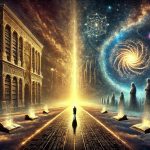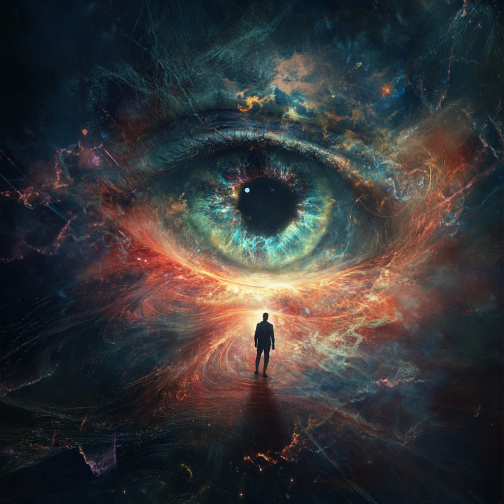
The Road to Alignment: How I Arrived at My Philosophy
February 8, 20252/7/2025
A Mind at the Crossroads
For as long as I can remember, I have been drawn to the supernatural, the eerie, the unknown. Horror movies captured my imagination as a child, not just for their ability to scare, but for the way they invited me into the abyss—into the space where the rational world crumbles, and something deeper, darker, and perhaps truer emerges. And yet, as a philosopher, I have been trained to question, to demand evidence, to resist blind belief. This has left me standing at a strange crossroads: How do I reconcile my love of mystery, horror, and the supernatural with my commitment to reason, structure, and intellectual rigor?
This tension is not just personal—it is philosophical. Many thinkers before me have walked this line, some veering into pure rationalism, others into mysticism. But I want to ask: Is there a way to embrace both? Can one be a philosopher and a mystic without contradiction?
Why We Need the Unknown
Modern philosophy and science have, in many ways, waged war against mystery. The supernatural is often dismissed as superstition, horror is written off as entertainment, and the unknown is seen as a problem to be solved rather than an experience to be engaged with. But what if the unknown is essential to our understanding of reality?
🔹 Horror as a Philosophical Tool: Horror, whether in film, literature, or folklore, forces us to confront existential dread, mortality, and the limits of human understanding. It reveals the gaps in our knowledge and dares us to peer into them.
🔹 Mysticism and Depth: Mystical traditions—from Hermeticism to Rosicrucianism—have long held that reality is not just what we perceive on the surface. Instead of asking, Is this supernatural belief true?, perhaps we should ask, What does this mystery reveal about the nature of consciousness and existence?
🔹 Psychology and the Supernatural: Jungian psychology suggests that ghosts, demons, and cosmic horrors might not be literal entities, but manifestations of unconscious fears, desires, and archetypes. Yet, does this mean they are not real? Or does it suggest that reality is shaped, at least in part, by the psyche?
🚀 Verdict: Mystery is not an enemy of reason—it is part of what makes reason necessary. Without the unknown, there is no inquiry, no growth, no philosophy.
The Trap of Pure Empiricism
While I believe in critical thinking, I also recognize the limits of empirical science. The world of consciousness, intuition, and experience often eludes strict measurement. If we demand scientific proof for every experience of the unknown, do we risk closing ourselves off to genuine phenomena?
🔹 Dean Radin’s psi research suggests that mind-matter interactions exist, yet mainstream science remains hesitant to explore them seriously. 🔹 Carl Jung’s work on synchronicity implies that meaning and alignment may operate outside standard causality. 🔹 David Chalmers’ Hard Problem of Consciousness forces us to ask whether reality is fundamentally mental, rather than strictly physical.
Verdict: Pure materialism cannot explain everything. A complete philosophy must leave room for the unexplored, the liminal, and the inexplicable.
A Framework for Alignment Between Reason and Mystery
So where does this leave me—and others who struggle with this same tension? I propose a three-tiered approach to engaging with the unknown without abandoning rational thought:
1️. Intellectual Rigor Without Dogma – Instead of dismissing supernatural experiences outright, we should explore them with the same intellectual curiosity that we apply to philosophy, psychology, and science. Ask: What patterns exist? What can be tested? What do these ideas mean psychologically, culturally, or metaphysically?
2️. Holding Space for Mystery – Some experiences may not fit neatly into an empirical framework. Rather than forcing an explanation, we can acknowledge mystery as part of reality. There is wisdom in not knowing—in allowing awe and wonder to shape our understanding.
3️. Horror as a Liminal Space – Horror allows us to test the boundaries between reality and the unknown in a safe yet profound way. Whether supernatural horror is “real” in a material sense is less important than the fact that it evokes genuine psychological and existential truths.
Verdict: By treating the supernatural as a philosophical challenge rather than an ideological battleground, we open new doors to inquiry and insight.
Conclusion: The Philosopher and the Mystic in Me
I do not want to abandon the supernatural. I do not want to cast away horror, mystery, and the eerie thrill of the unknown. But I also do not want to become lost in blind belief, to accept untested assumptions, or to mistake fantasy for truth. This is the balance I must strike—the balance that I believe others seek as well.
Philosophy and mysticism need not be enemies. Horror and wisdom are not opposites.
🔥 This is the challenge: To live as both a philosopher and a mystic. To align with reality without losing the mystery.
